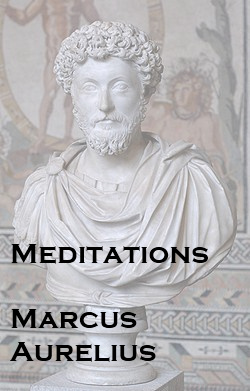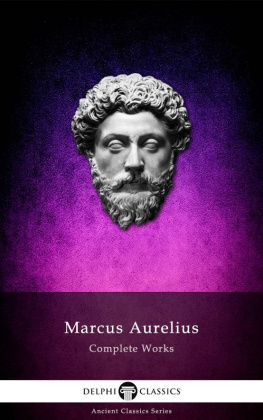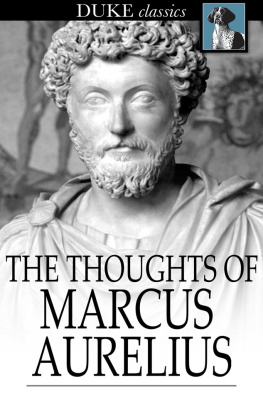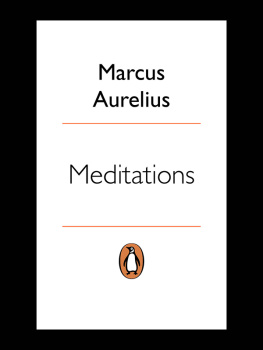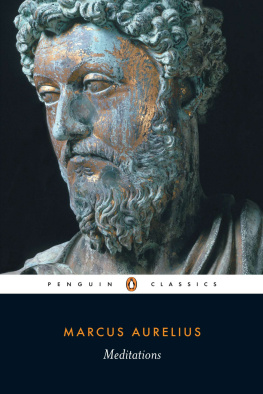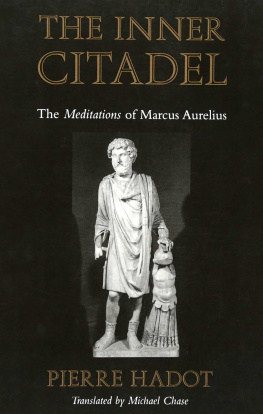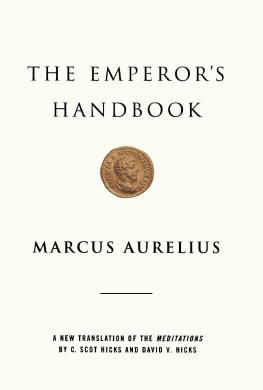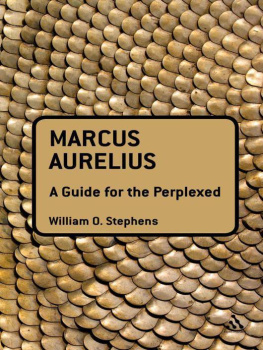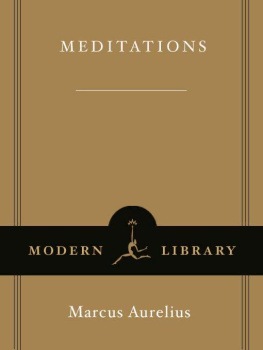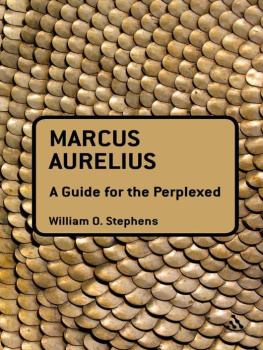INTRODUCTION
MARCUS AURELIUS ANTONINUS was born on April 26, A.D. 121. Hisreal name was M. Annius Verus, and he was sprung of a noble familywhich claimed descent from Numa, second King of Rome. Thus the mostreligious of emperors came of the blood of the most pious of earlykings. His father, Annius Verus, had held high office in Rome, andhis grandfather, of the same name, had been thrice Consul. Both hisparents died young, but Marcus held them in loving remembrance. Onhis father's death Marcus was adopted by his grandfather, theconsular Annius Verus, and there was deep love between these two.On the very first page of his book Marcus gratefully declares howof his grandfather he had learned to be gentle and meek, and torefrain from all anger and passion. The Emperor Hadrian divined thefine character of the lad, whom he used to call not Verus butVerissimus, more Truthful than his own name. He advanced Marcus toequestrian rank when six years of age, and at the age of eight madehim a member of the ancient Salian priesthood. The boy's aunt,Annia Galeria Faustina, was married to Antoninus Pius, afterwardsemperor. Hence it came about that Antoninus, having no son, adoptedMarcus, changing his name to that which he is known by, andbetrothed him to his daughter Faustina. His education was conductedwith all care. The ablest teachers were engaged for him, and he wastrained in the strict doctrine of the Stoic philosophy, which washis great delight. He was taught to dress plainly and to livesimply, to avoid all softness and luxury. His body was trained tohardihood by wrestling, hunting, and outdoor games; and though hisconstitution was weak, he showed great personal courage toencounter the fiercest boars. At the same time he was kept from theextravagancies of his day. The great excitement in Rome was thestrife of the Factions, as they were called, in the circus. Theracing drivers used to adopt one of four coloursred, blue, white,or greenand their partisans showed an eagerness in supporting themwhich nothing could surpass. Riot and corruption went in the trainof the racing chariots; and from all these things Marcus heldseverely aloof.
In 140 Marcus was raised to the consulship, and in 145 hisbetrothal was consummated by marriage. Two years later Faustinabrought him a daughter; and soon after the tribunate and otherimperial honours were conferred upon him.
Antoninus Pius died in 161, and Marcus assumed the imperialstate. He at once associated with himself L. Ceionius Commodus,whom Antoninus had adopted as a younger son at the same time withMarcus, giving him the name of Lucius Aurelius Verus. Henceforththe two are colleagues in the empire, the junior being trained asit were to succeed. No sooner was Marcus settled upon the thronethan wars broke out on all sides. In the east, Vologeses III. ofParthia began a long-meditated revolt by destroying a whole RomanLegion and invading Syria (162). Verus was sent off in hot haste toquell this rising; and he fulfilled his trust by plunging intodrunkenness and debauchery, while the war was left to his officers.Soon after Marcus had to face a more serious danger at home in thecoalition of several powerful tribes on the northern frontier.Chief among those were the Marcomanni or Marchmen, the Quadi(mentioned in this book), the Sarmatians, the Catti, the Jazyges.In Rome itself there was pestilence and starvation, the one broughtfrom the east by Verus's legions, the other caused by floods whichhad destroyed vast quantities of grain. After all had been donepossible to allay famine and to supply pressing needsMarcus beingforced even to sell the imperial jewels to find moneyboth emperorsset forth to a struggle which was to continue more or less duringthe rest of Marcus's reign. During these wars, in 169, Verus died.We have no means of following the campaigns in detail; but thusmuch is certain, that in the end the Romans succeeded in crushingthe barbarian tribes, and effecting a settlement which made theempire more secure. Marcus was himself commander-in-chief, andvictory was due no less to his own ability than to his wisdom inchoice of lieutenants, shown conspicuously in the case of Pertinax.There were several important battles fought in these campaigns; andone of them has become celebrated for the legend of the ThunderingLegion. In a battle against the Quadi in 174, the day seemed to begoing in favour of the foe, when on a sudden arose a great storm ofthunder and rain the lightning struck the barbarians with terror,and they turned to rout. In later days this storm was said to havebeen sent in answer to the prayers of a legion which contained manyChristians, and the name Thundering Legion should be given to it onthis account. The title of Thundering Legion is known at an earlierdate, so this part of the story at least cannot be true; but theaid of the storm is acknowledged by one of the scenes carved onAntonine's Column at Rome, which commemorates these wars.
The settlement made after these troubles might have been moresatisfactory but for an unexpected rising in the east. AvidiusCassius, an able captain who had won renown in the Parthian wars,was at this time chief governor of the eastern provinces. Bywhatever means induced, he had conceived the project of proclaiminghimself emperor as soon as Marcus, who was then in feeble health,should die; and a report having been conveyed to him that Marcuswas dead, Cassius did as he had planned. Marcus, on hearing thenews, immediately patched up a peace and returned home to meet thisnew peril. The emperors great grief was that he must needs engagein the horrors of civil strife. He praised the qualities ofCassius, and expressed a heartfelt wish that Cassius might not bedriven to do himself a hurt before he should have the opportunityto grant a free pardon. But before he could come to the east newshad come to Cassius that the emperor still lived; his followersfell away from him, and he was assassinated. Marcus now went to theeast, and while there the murderers brought the head of Cassius tohim; but the emperor indignantly refused their gift, nor would headmit the men to his presence.
On this journey his wife, Faustina, died. At his return theemperor celebrated a triumph (176). Immediately afterwards herepaired to Germany, and took up once more the burden of war. Hisoperations were followed by complete success; but the troubles oflate years had been too much for his constitution, at no timerobust, and on March 17, 180, he died in Pannonia.
The good emperor was not spared domestic troubles. Faustina hadborne him several children, of whom he was passionately fond. Theirinnocent faces may still be seen in many a sculpture gallery,recalling with odd effect the dreamy countenance of their father.But they died one by one, and when Marcus came to his own end onlyone of his sons still livedthe weak and worthless Commodus. On hisfather's death Commodus, who succeeded him, undid the work of manycampaigns by a hasty and unwise peace; and his reign of twelveyears proved him to be a ferocious and bloodthirsty tyrant. Scandalhas made free with the name of Faustina herself, who is accused notonly of unfaithfulness, but of intriguing with Cassius and egginghim on to his fatal rebellion, it must be admitted that thesecharges rest on no sure evidence; and the emperor, at all events,loved her dearly, nor ever felt the slightest qualm ofsuspicion.

